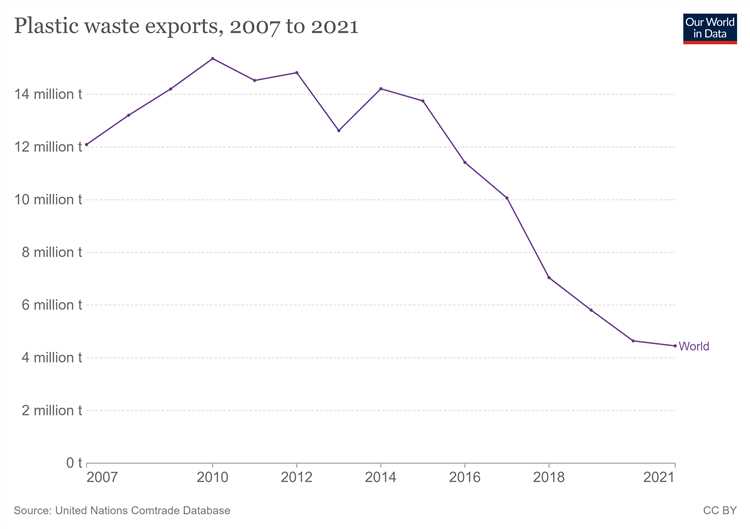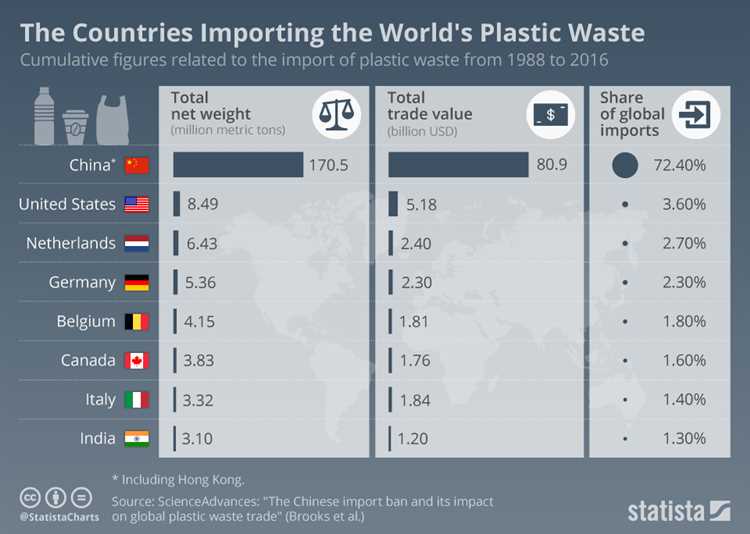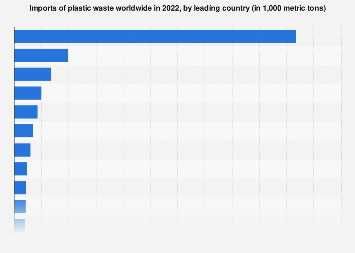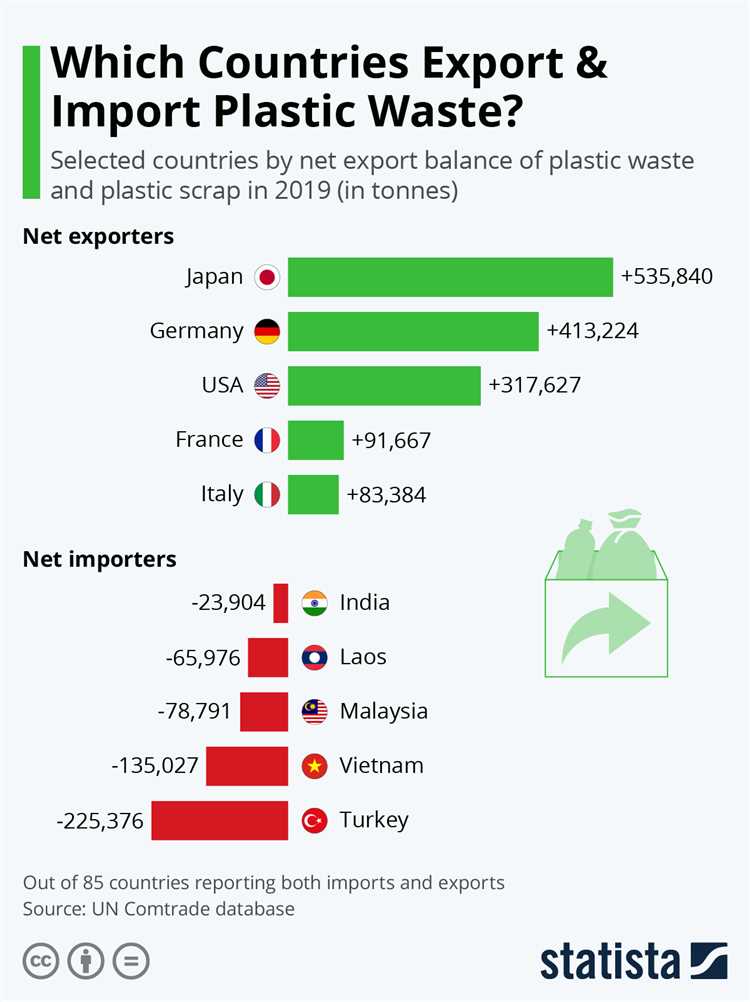
In today’s fast-paced world, plastic waste has become a pressing issue that needs immediate attention. As the demand for plastic products continues to rise, so does the amount of plastic waste being generated. While many countries grapple with this problem, one country stands out as the largest importer of plastic waste – China.
China has long been known as the world’s factory, producing and exporting a wide range of goods. However, this industrial powerhouse has also become the largest consumer of plastic products, leading to a significant increase in plastic waste. In an effort to address this issue, China started importing plastic waste from other countries, including developed nations.
Why would China import plastic waste, you may wonder? The answer lies in the country’s booming recycling industry. China has developed advanced recycling technologies and facilities that can process large quantities of plastic waste. By importing plastic waste, China is able to feed its recycling plants and extract valuable resources from the discarded materials.
However, this influx of imported plastic waste has not come without consequences. The sheer volume of waste has put a strain on China’s recycling infrastructure, leading to environmental and health concerns. The improper handling and disposal of plastic waste have resulted in pollution of rivers, soil, and air, affecting both human and animal life.
Recognizing the urgency of the situation, China has recently implemented stricter regulations on the import of plastic waste. The government is now limiting the types and amount of plastic waste that can be brought into the country. This move aims to encourage domestic recycling and reduce the reliance on imported waste.
While China may currently hold the title of the largest importer of plastic waste, it is important for all countries to take responsibility for their own waste management. The issue of plastic waste requires a global effort, with countries working together to develop sustainable solutions and reduce plastic consumption. Only through collective action can we hope to tackle this growing problem and protect our planet for future generations.
- The Global Issue of Plastic Waste
- Understanding Plastic Waste
- Types of Plastic Waste
- Environmental Impact of Plastic Waste
- The Impact of Plastic Waste on the Environment
- 1. Land Pollution
- 2. Water Pollution
- Exploring the Importance of Recycling
- Benefits of Recycling
- Tips for Effective Recycling
- The Role of Importers in the Plastic Waste Trade
- Economic Impact
- Environmental Impact
- Social Impact
- The Future of Plastic Waste Management and Importation
- 1. Adoption of Circular Economy Principles
- 2. Embracing Advanced Recycling Technologies
- FAQ:
- Which country is the largest importer of plastic waste?
- Why is China the largest importer of plastic waste?
- Are there any negative consequences of being the largest importer of plastic waste?
- What actions has China taken to address the issue of plastic waste?
- Which countries have increased their plastic waste imports since China’s ban?
- Which country is the largest importer of plastic waste?
The Global Issue of Plastic Waste

Plastic waste has become one of the most significant environmental challenges in the world today. With the rise of consumerism and rapid population growth, the production and consumption of plastic materials have reached unprecedented levels. Unfortunately, the management and disposal of plastic waste have not kept pace with this increase, leading to severe consequences for the environment and human health.
Plastic pollution poses a serious threat to our oceans, rivers, and land. Every year, millions of tons of plastic waste end up in our water bodies, causing harm to marine life and ecosystems. Marine animals, such as turtles, whales, and seabirds, often mistake plastic debris for food and can suffer from malnutrition or even death as a result. Additionally, plastic waste breaks down into microplastics, which can be ingested by marine organisms and make their way up the food chain, potentially reaching humans.
The impact of plastic waste also extends to terrestrial environments. Improper disposal of plastic waste can lead to pollution of soil and water sources, affecting agricultural productivity and posing a threat to human health. Plastic waste can take hundreds of years to decompose, and during this time, it releases harmful chemicals and pollutants into the environment, contributing to pollution and climate change.
Addressing the global issue of plastic waste requires collective action and innovative solutions. Governments, businesses, and individuals must work together to reduce the production and consumption of single-use plastics, promote recycling and waste management systems, and invest in research and development of sustainable alternatives. Education and awareness campaigns are also crucial to changing consumer behavior and fostering a mindset of responsible consumption and waste reduction.
Ultimately, tackling the global issue of plastic waste is not only an environmental imperative but also a social and economic necessity. By taking decisive action to reduce plastic waste, we can protect our planet for future generations and create a more sustainable and resilient future for all.
Understanding Plastic Waste
Plastic waste is a growing concern worldwide, as it poses numerous environmental and health risks. Understanding the nature of plastic waste is crucial in finding effective solutions and mitigating its impact on the planet.
Types of Plastic Waste

Plastic waste comes in various forms, such as bottles, bags, packaging materials, and single-use items. These plastics are typically made from different types of polymers, including polyethylene, polypropylene, and polyvinyl chloride (PVC).
Environmental Impact of Plastic Waste
The improper disposal of plastic waste leads to significant environmental consequences. Plastic waste often finds its way into bodies of water, where it contributes to marine pollution, endangering marine life and ecosystems. Additionally, plastic waste does not decompose easily and can persist in the environment for hundreds of years.
| Issue | Impact |
|---|---|
| Microplastics | Microplastics enter the food chain and can be ingested by marine animals and humans, posing health risks. |
| Landfill Space | Plastic waste takes up valuable landfill space, which is already limited. |
| Greenhouse Gas Emissions | The production and incineration of plastic waste contribute to greenhouse gas emissions, exacerbating climate change. |
By understanding the harmful effects of plastic waste, we can work towards reducing its production, implementing proper waste management systems, and promoting sustainable alternatives to plastic products.
The Impact of Plastic Waste on the Environment
Plastic waste has become a major environmental concern worldwide. The excessive use and improper disposal of plastic products have led to significant negative effects on the environment. The impact of plastic waste is evident in various aspects, including land, water, and wildlife.
1. Land Pollution
One of the primary impacts of plastic waste is land pollution. Improper disposal of plastics, such as littering or dumping in landfills, leads to the accumulation of plastic waste in the soil. As plastic is non-biodegradable, it remains in the environment for hundreds of years, taking up valuable space in landfills and causing soil pollution. This not only affects the fertility of the soil but also poses a threat to plants and other organisms that depend on the soil for their survival.
2. Water Pollution
Plastic waste also has a significant impact on water pollution. When plastic products are discarded in water bodies such as rivers, lakes, or oceans, they break down into microplastics over time. These microplastics can contaminate the water and harm marine life. Marine animals often mistake plastic debris for food, leading to ingestion and subsequent health problems. Additionally, the presence of plastic waste in water bodies can disrupt ecosystems and alter the balance of aquatic life.
| Type of Environmental Impact | Explanation |
|---|---|
| Air Pollution | Plastic waste burning releases harmful toxins into the atmosphere, contributing to air pollution and climate change. |
| Wildlife Disturbance | Plastic waste entanglement can cause injury or death to various wildlife species, disrupting their natural habitat and populations. |
| Ecosystem Disruption | The presence of plastic waste in ecosystems can disrupt the food chain and overall balance, leading to long-term environmental damage. |
Considering the severe impact of plastic waste on the environment, it is crucial to promote sustainable practices such as reducing plastic consumption, implementing recycling programs, and advocating for proper waste management. By taking proactive measures, we can minimize the detrimental effects of plastic waste and protect our planet for future generations.
Exploring the Importance of Recycling
Recycling is a crucial practice that plays a significant role in conserving resources and protecting the environment. It involves the process of collecting, sorting, and transforming waste materials into new products. By recycling, we can reduce the demand for raw materials, save energy, and mitigate the negative impacts of waste disposal.
Benefits of Recycling
1. Conservation of Resources: Recycling helps preserve valuable natural resources such as timber, water, and minerals. Instead of extracting new materials from the earth, recycled items can be used to produce new products, leading to a reduction in resource depletion.
2. Reduction in Landfill Waste: Recycling reduces the amount of waste sent to landfills, thereby reducing air and water pollution. It helps to prevent harmful chemicals and toxins from leaching into the soil and groundwater, protecting ecosystems and human health.
3. Energy Savings: The production of new items requires a significant amount of energy. Recycling reduces energy consumption by using recycled materials instead of raw materials. It takes less energy to process recycled materials, reducing greenhouse gas emissions and combating climate change.
Tips for Effective Recycling

- Know and follow local recycling guidelines to ensure proper recycling practices.
- Separate different types of recyclables, such as paper, plastic, glass, and metal.
- Consider composting organic waste to reduce the amount of waste sent to landfills.
- Support recycling initiatives and programs in your community.
- Reuse items whenever possible to extend their lifespan and reduce waste.
Recycling is a responsibility that we all share. By adopting recycling practices in our daily lives, we can contribute to a more sustainable future and protect our planet for generations to come.
The Role of Importers in the Plastic Waste Trade
Importers play a crucial role in the global plastic waste trade as they are responsible for bringing plastic waste materials from exporting countries to their own. Their involvement in this trade has significant economic, environmental, and social impacts.
Economic Impact
Importers of plastic waste often take advantage of the lower costs associated with recycling in some exporting countries. By importing plastic waste, they can access cheaper raw materials, which can be used in various industries such as manufacturing and packaging. This allows importers to reduce their production costs and remain competitive in the global market.
Moreover, plastic waste importers can generate revenue by processing and reselling the recycled plastic materials. They play a crucial role in the recycling industry by supplying recycled plastic materials to manufacturers who are eager to reduce their carbon footprint and promote sustainability.
Environmental Impact
Importers of plastic waste contribute to both the positive and negative environmental impacts of the plastic waste trade. On the positive side, they help reduce the amount of plastic waste that would otherwise end up in landfills or be improperly disposed of in exporting countries. By importing plastic waste for recycling, importers contribute to the conservation of natural resources and reduce the carbon emissions associated with the production of virgin plastic materials.
However, the environmental impact can be negative if proper recycling and waste management practices are not followed. In some cases, importing countries may lack the infrastructure and capacity to properly handle and process the large amounts of plastic waste they receive. This can lead to environmental pollution, especially if the plastic waste is not adequately managed or disposed of. Importers must ensure that they partner with responsible and certified recycling facilities to minimize the environmental impact of the plastic waste trade.
Social Impact
The involvement of importers in the plastic waste trade also has social implications. Importing plastic waste from exporting countries can create jobs and stimulate economic growth in both the importing and exporting countries. In exporting countries, individuals and communities involved in collecting and sorting plastic waste can earn income and improve their living conditions. In importing countries, the recycling industry can create employment opportunities, particularly in the manufacturing and packaging sectors.
However, social issues can arise if the working conditions and labor practices in the plastic waste trade are not regulated and monitored. Importers must ensure that the individuals involved in the collection and sorting of plastic waste are protected and provided with fair wages and safe working conditions. It is important to prioritize the well-being and rights of workers throughout the entire plastic waste trade process.
| Key Points |
|---|
| – Importers bring plastic waste from exporting countries for recycling. |
| – They benefit from lower recycling costs and access to cheaper raw materials. |
| – Importers play a crucial role in the recycling industry by supplying recycled plastic materials. |
| – They contribute to reducing plastic waste and conserving natural resources. |
| – Proper waste management practices and partnerships with responsible recycling facilities are essential. |
| – Importing plastic waste can create jobs and stimulate economic growth in both importing and exporting countries. |
| – Ensuring fair wages and safe working conditions for individuals involved in the plastic waste trade is important. |
The Future of Plastic Waste Management and Importation
As the largest importer of plastic waste, the country faces many challenges in managing and handling this growing environmental issue. However, with the increasing awareness and urgency to address plastic waste, the future of plastic waste management and importation is constantly evolving.
1. Adoption of Circular Economy Principles
The future of plastic waste management lies in the adoption of circular economy principles. This means moving away from the linear model of “take, make, dispose” and shifting towards a model that promotes recycling, reusing, and reducing plastic waste. By implementing strategies that focus on reducing single-use plastics and increasing recycling rates, the country can effectively manage and minimize the impact of plastic waste.
2. Embracing Advanced Recycling Technologies
Another aspect of the future of plastic waste management is the embrace of advanced recycling technologies. Traditional recycling processes often have limitations, resulting in a large portion of plastic waste being incinerated or sent to landfills. However, advanced recycling technologies, such as chemical recycling and depolymerization, offer innovative solutions for efficiently converting plastic waste into valuable resources.
These technologies can break down plastic waste into its basic components, allowing for the production of new plastics or other materials. By investing in and adopting these advanced recycling technologies, the country can reduce reliance on imports and ensure a more sustainable and efficient plastic waste management system.
In conclusion, the future of plastic waste management and importation requires a shift towards circular economy principles and the embrace of advanced recycling technologies. By adopting these strategies, the country can effectively manage its plastic waste while reducing the environmental impact and promoting a more sustainable future.
FAQ:
Which country is the largest importer of plastic waste?
The largest importer of plastic waste is China.
Why is China the largest importer of plastic waste?
China became the largest importer of plastic waste because of its high demand for raw materials and cheap labor. International plastic waste was often sent to China for recycling.
Are there any negative consequences of being the largest importer of plastic waste?
Yes, being the largest importer of plastic waste has had negative consequences for China. The country’s recycling system struggled to cope with the large quantities of plastic waste, leading to pollution and environmental issues.
What actions has China taken to address the issue of plastic waste?
China has taken several actions to address the issue of plastic waste. In 2018, the country implemented a ban on the import of certain types of plastic waste. This has forced other countries to find alternative solutions for their plastic waste.
Which countries have increased their plastic waste imports since China’s ban?
Since China’s ban on plastic waste imports, countries such as Malaysia, Vietnam, and Thailand have increased their imports of plastic waste. However, these countries have also faced challenges in managing the increased amount of waste.
Which country is the largest importer of plastic waste?
The largest importer of plastic waste is China.